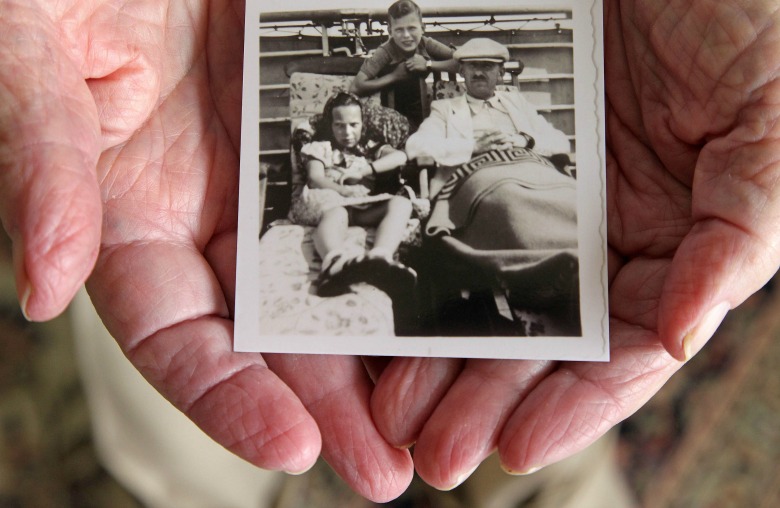
One of the survivors of the 900 Jewish refugees aboard the St. Louis ocean liner, which the United States turned away from its shores in 1939, shares a photo of his family on the ship. (Carl Juste/Miami Herald/TNS/Getty Images)
As as we waited to cross the border, my mother held her breath. She clutched my hand, with my father and brother beside us, as we sat on an old bus that crossed over from the Soviet Union into Poland in September 1989. We celebrated my brother’s birthday in Warsaw and, the following day, left for Czechoslovakia, spent two weeks in Austria, and several months in Italy, where we waited for permission to fly to the United States as Jewish refugees.
Crossing the Soviet border was nerve-wracking. After a decade of paperwork, pleading, and stonewalling, we had the documents lined up. But the Soviet bureaucracy was capricious and the border agents were often petty and anti-Semitic, so we had no peace of mind from the papers that said we were allowed to leave, and that we would be welcomed in the United States. The months-long limbo we endured as we traversed Europe, sometimes sleeping in bus stations on top of our luggage, provided little relief. It was not until we landed at JFK airport months later that my mother could finally exhale.
Nearly three decades after my family came to the United States, refugees today anxiously hold their breath because what seemed certain to us—that we would be welcomed in our new home—is no longer so obvious.
We were certain that America’s doors would be open to us when we landed in our new home because of wise American leadership, which understood inviting Soviet Jews to emigrate to the United States was a foreign policy boon during the Cold War. America’s refugee policy dramatized desperately lacking religious freedom in the USSR, it encouraged the activism of local human rights groups, and it created a terrible brain drain for the country. Encouraging Jews to get out and welcoming them as refugees helped hasten the Soviet Union’s collapse.
That policy was crafted by conservatives, who understood that American power depended on a humane refugee policy. It is a lesson worth remembering today as we fight the war on terror.
Nobody did more to publicize the plight of Soviet Jews in the 1970s than Senator Henry “Scoop” Jackson, whom historian Barbara Keys calls “the grandfather of neoconservatism.” Jackson, a hawkish Democrat, worked to undermine détente between the United States and the USSR. And he feared that Richard Nixon and Henry Kissinger were cutting trade and arms deals with the Soviet Union but ignoring the plight of Jews in that country. So he crafted bipartisan legislation that increased refugee quotas for Jews, tied trade policy to the observance of human rights, and limited executive power to conduct deals without congressional oversight. It was a shrewd move with lasting consequences for America and for my family.
Jackson’s invitation for Jews to flee the USSR and come to the United States overcame longstanding fears of the dangers of immigration—fears as old as the nation itself.
In the twentieth century alone, Americans worried that the wave of Italian immigrants before World War I was full of bomb-throwing anarchists. In the 1930s, State Department officials wondered whether Jewish refugees were really German fifth-columnists in disguise, and they turned away thousands—including Anne Frank’s family. In the 1950s, more than a million Chinese fled the communist takeover of China and many of them applied for American asylum from Hong Kong. Suspecting that these desperate refugees were in fact communist infiltrators, the State Department implemented extreme vetting. According to historian Mae Ngai, asylum seekers were asked to perform absurdly difficult tasks, like listing “all the people who lived within five houses on all sides of your last place of residence in China before you came to the U.S. and state their relationship to you if any.”
Hysteria about immigrants is nothing new. But Senator Jackson understood that reasonable desires for security could be balanced with an openness to refugees that highlighted America’s moral high ground.
A recent State Department dissent memorandum called the balanced approach to refugees “Secure Borders and Open Doors.” The Trump administration’s first executive order banning travelers from seven predominantly Muslim countries, they rightly argued, makes Americans less safe. It will sour relations with Muslim nations, stoke anti-Americanism worldwide, undermine humanitarian efforts, and negatively impact the American economy. In sum, the executive order “runs counter to core American values of nondiscrimination, fair play, and extending a warm welcome to foreign visitors and immigrants.” The revised executive order continues to run counter to American values and to the conservative tradition of “Scoop” Jackson.
Fears of immigrants as terrorists, infiltrators, and fifth columnists are alive and well among conservatives today but the importance of a humane program that improves America’s image and serves to protect our strategic interests abroad is in danger of being lost. We need a smart and humane refugee program more than ever.
It is not too late to reverse course. Liberals have a long tradition of support for human rights and tolerance to lean on in these times. And conservatives, who recognize the danger to America the latest immigration ban poses, can begin to rebuild America’s reputation by acting in the tradition of Jackson.
Now is the time for action in Congress. Before courts adjudicate the latest version of Trump’s so-called Muslim ban, our legislators need to step up and formulate a sound immigration policy that enhances America’s place in the world. Leaders on both sides of the aisle must reassert congressional control over refugee policy. Refugees face enough uncertainty already. We have an obligation to make JFK and airports across the country places where desperate families fleeing conflict can finally exhale again.
Gene Zubovich is a postdoctoral fellow at the John C. Danforth Center on Religion and Politics. Follow him @genezubovich.